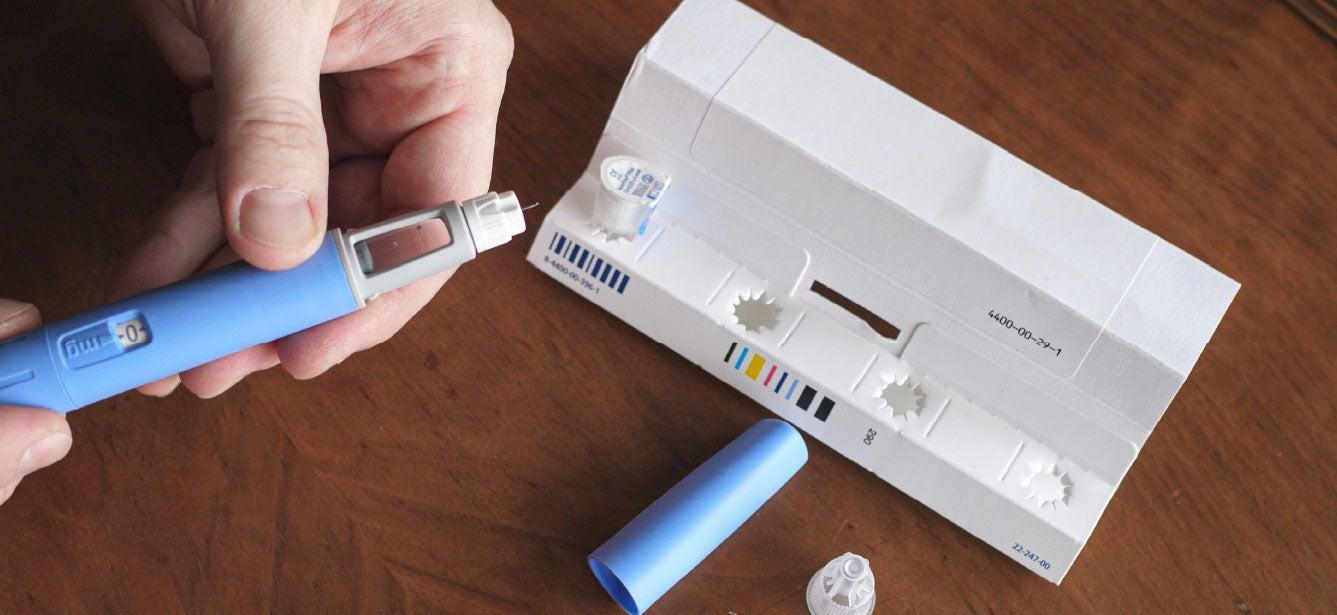
Related Topics
Doctors use many things to determine good medication therapy for their patients, including their training, experience, and disease treatment guidelines. The AGS Beers Criteria® is just one useful tool to help avoid potentially risky medications
What is the AGS Beers Criteria?
The AGS Beers Criteria (also known as the Beers List), is a special list of medicines used by health care professionals to identify medications that may cause harm that outweigh benefits when prescribed for older adults, aiming to protect them from potential risks.1 These medicines are also called Potentially Inappropriate Medications (PIMs), with some available by prescription and others over the counter (OTC).
If you are prescribed a medication on this list, it is important to ask your doctor about your concerns about the risks and ask about alternative, safer treatments. Never stop taking a medication without first consulting your doctor.
The purpose of this article is to make the AGS Beers Criteria easier to understand for both older adults and their care partners. It is separated into five key takeaway categories:
- Medications that cause confusion or difficulty in thinking
- Medications that can lead to falls and other physical injuries
- Medications that can cause severe bleeding
- Medications that can cause dangerously low blood glucose (sugar)
- Medications that can cause death, stroke or cognitive decline in patients with dementia
Each category lists the drug class and what they are commonly used for. Note that some drug classes may appear in more than one takeaway category. We also list symptoms that you should bring up with your doctor if you experience them. The full Beers List, along with other resources and information, is available online from the American Geriatrics Society.
Why are older adults more susceptible to negative effects from some drugs?
As your body ages, it can undergo a lot of changes that can make you more sensitive to certain medications. These changes are natural and will often affect important parts of your body, like the liver and kidneys, which work to break down and remove drugs. As we age, these organs don’t work as well as they did when we were younger, which can cause medications to build up to high levels or stay in the body for too long, causing more side effects to occur.
We also become more sensitive to some medications with age, so even small doses of medicine can have a large impact. Older adults are often on many medications that treat multiple health problems. Taking many medications can lead to interactions, which can make them not work well together or cause harmful effects. This can make choosing a drug very difficult for doctors and prescribers.
Medications that can cause confusion or difficulty in thinking
There are many different uses for these drugs. Some medications work in the brain to help with conditions related to brain function (i.e. depression, anxiety, etc.) while others are for diseases outside of the brain (i.e. overactive bladder). Most of them can cause confusion by entering the brain and interfering with normal function. You may hear the word “anticholinergic” used to refer to the properties of some of these drugs that cause confusion.
Symptoms to watch out for:
- Brain—alternating between confusion and clarity, decreased attention and memory, mood swings and irritability, difficulty falling asleep or staying awake.
- Muscles—tremors, faster or slower movement
- Other—changes in appetite, changes in urinating, inability to hold urine.
Examples of some medications:
- Drugs for depression
- Drugs for nausea and vomiting
- Drugs for allergies; cold symptoms
- Drugs for overactive bladder; incontinence
- Drugs to treat symptoms of Parkinson’s disease
- Drugs to treat psychosis such as schizophrenia, bipolar disorder, etc.
- Drugs for abdominal/intestinal cramping:
Atropine (AtroPen®), Clidinium-chlordiazepoxide (Librax®), Dicyclomine (Bentyl®), Homatropine (Hycodan®), Hyoscyamine (Levsin®, Symax®), Scopolamine (Transderm Scop®, Scopace®, Maldemar®) - Drugs for muscle spasms:
Cyclobenzaprine (Flexeril®, Amrix®, Fexmid®), Orphenadrine (Norflex®) - Drugs for anxiety, sleep, or alcohol withdrawal
- Drugs to decrease stomach acid levels:
Cimetidine (Tagamet®), Famotidine (Pepcid®), Nizatidine (Axid®) - Drugs for sleep/insomnia
Medications that can lead to falls and other physical injuries
Many medications have been linked to increasing the risk of falls and the Beers Criteria lists the ones of most concern. They can lead to a loss of coordination and balance, and cause weakness by entering the brain and preventing normal function. This is especially dangerous for older adults that are frail, since it can cause broken bones and head injury. In combination with key takeaway 3: Medications that Cause Severe Bleeding, a fall resulting in a head injury can lead to bleeding into the brain which can be deadly.
Symptoms to watch out for:
- Brain—confusion, disorientation, dizziness
- Muscles—coordination and balance problems, muscle weakness in legs
- Other—low blood pressure, blurred vision, history of falls
Examples of some medications: (Click on categories below to see the full list of drugs)
- Drugs for anxiety, sleep, or alcohol withdrawal
- Drugs for sleep/insomnia
- Drugs for depression
- Drugs for nausea and vomiting
- Drugs for allergies
- Drugs for overactive bladders
- Drugs to treat symptoms of Parkinson’s disease
- Drugs to treat psychosis such as schizophrenia, bipolar disorder, etc.
- Drugs for seizures and epilepsy
Medications that can cause severe bleeding
These drugs include blood thinners, which are used to prevent your blood from clotting too quickly. However, it can be dangerous if bleeding does occur and cannot be stopped. Certain pain medications known as non-steroidal anti-inflammatory drugs (NSAIDs) can also cause bleeding internally, which can be more difficult to detect. NSAIDS cause internal bleeding in two ways; they cause damage to the stomach/intestinal lining and interfere with normal blood clotting. NSAIDs can be either prescription medication or found over the counter (OTC). It is important to note that if you experience any of these symptoms, they require IMMEDIATE attention!
Symptoms to watch out for:
- Brain bleeding—severe headache, sudden confusion, fainting, impaired coordination
- Stomach/intestinal bleeding—vomiting blood, passing black/tarry or bright red stool
- Severe and uncontrolled bleeding—dizziness, low blood pressure, increased heart rate, weakness, pale skin, shortness of breath, fatigue
Examples of some medications: (Click on categories below to see the full list of drugs)
- Blood thinners to prevent a stroke or heart attack:
Aspirin (Acetylsalicylic acid), Warfarin (Coumadin®, Jantoven®), Clopidogrel (Plavix®), Dabigatran (Pradaxa®), Prasugrel (Effient®), Rivaroxaban (Xarelto®), Ticagrelor (Brilinta®), - Pain medications (NSAIDs)
Medications that can cause low blood glucose (sugar)
These medications work to lower your blood glucose (sugar) levels and are commonly used for patients with diabetes. If these levels drop too quickly or too much (hypoglycemia) it can be dangerous and can cause an increased risk in falling, cause confusion, and affect the vital organs in the body.
Symptoms to watch out for:
- Brain—confusion, dizziness, mood swings, anxiety, nervousness, irritability
- Muscles—weakness, fatigue, shaking
- Vital signs—increased heart rate
- Other—increased appetite, blurred vision, sweating
Examples of some medications:
- Insulins, short- or rapid-acting (injectable) (Only when used alone; without a long-acting insulin for basal glucose control):
Regular Insulin (Humulin R®, Novolin R®), Insulin Lispro (Humalog®, Lyumjev®), Insulin Aspart (NovoLog®, NovoRapid®, Fiasp®), Insulin Glulisine (Apidra®) - Sulfonylureas (a class of drugs taken by mouth that lower blood glucose (sugar) levels):
Glyburide (DiaBeta®, Glynase®, Micronase®), Glimepiride (Amaryl®), Glipizide (Glucotrol®, Glucotrol XL®), Gliclazide (Diamicron®, Dianorm®)
Medications that can cause death, stroke or cognitive decline in patients with dementia
These medications are usually appropriately used for certain mental illnesses such as schizophrenia, bipolar disorder, Parkinson disease psychosis, or depression. Unfortunately, they may be prescribed for symptoms seen in dementia. In 2005, the FDA issued their strongest warning against using these medications in people with dementia. They can cause death by affecting the vital functions in the body such as the heart, lungs, or other muscles.
Symptoms to watch out for:
- Brain—severe confusion, increased sleepiness
- Muscles —severe weakness or fatigue,
- Vitals—change in blood pressure, heart rate, or breathing
- Other—severe weight loss or decreased appetite
Examples of some medications:
When in doubt, talk to your doctor or pharmacist
Alice Brennan, an energetic and independent woman, tragically fell victim to preventable medication harm and system failures that led to her death at the age of 88.
Ask your doctor or pharmacist about your medications and their side effects. Are they safe for you now that you’re older? Make sure you aren’t on too many, or any unnecessary drugs that can be harmful to your health. It is important to keep an accurate and up-to-date list of all of your medications and their doses, including supplements and over the counter (OTC) medications, and review them with your doctor each visit.
Specfic medications in each category
Drugs for allergies; cold symptoms
Diphenhydramine (Benadryl®), Bromopheniramine (Bromfed®), Chlorpheniramine (Chlor-Trimeton®), Cyproheptadine (Periactin®), Dimenhydrinate (Dramamine®), Doxylamine (Unisom®), Hydroxyzine (Vistaril®, Atarax®), Meclizine (Antivert®), Promethazine (Phenergan®), Triprolidine (Actifed®).
Many of these drugs are combined in cold, flu and allergy remedies. Check the active ingredients or ask at the pharmacy counter.
Drugs for anxiety, sleep, or alcohol withdrawal:
Alprazolam (Xanax®), Chlordiazepoxide (Librium®), Clobazam (Onfil®), Clonazepam (Klonopin®), Clorazepate (Tranxene®), Diazepam (Valium®), Estazolam (Prosom®), Lorazepam (Ativan®), Midazolam (Versed®), Oxazepam (Serax®), Temazepam (Restoril®), Triazolam (Halcion®)
Drugs for depression:
Amitriptyline (Elavil®), Amoxapine (Asendin®), Citalopram (Celexa®), Clomipramine (Anafranil®), Desipramine (Norpramin®), Desvenlafaxine (Khedezla®, Pristiq®), Doxepin when >6 mg/day (Sinequan®), Duloxetine (Cymbalta®, Drizalma®, Irenka®), Escitalopram (Lexapro®), Fluoxetine (Prozac®, Sarafem®, Symbyax®), Fluvoxamine (Luvox®), Imipramine (Tofranil®), Levomilnacipran (Fetzima®), Milnacipran (Savella®), Nortriptyline (Pamelor®), Paroxetine (Paxil®), Sertraline (Zoloft®), Venlafaxine (Effexor®), Vilazodone (Viibryd®)
Drugs for overactive bladder; incontinence
Oxybutynin (Ditropan®, Ditropan XL®, Oxytrol®), Darifenacin (Enablex®), Fesoterodine (Toviaz®), Flavoxate (Urispas®), Solifenacin (Vesicare®), Tolterodine (Detrol®, Detrol LA®), Trospium (Sanctura®)
Drugs for nausea and vomiting
Prochlorperazine (Compazine®), Promethazine (Phenergan®)
Pain medications (NSAIDs):
Aspirin (especially when >325 mg/day), Diclofenac (Voltaren®, Cataflam®), Diflunisal (Dolobid®), Etodolac (Lodine®), Flurbiprofen (Ansaid®), Ibuprofen (Advil®, Motrin®), Indomethacin (Indocin®), Ketorolac (Toradol®), Meloxicam (Mobic®), Nabumetone (Relafen®), Naproxen (Aleve®, Naproxyn®), Oxaprozin (Daypro®), Piroxicam (Feldene®), Sulindac (Clinoril®)
Drugs to treat symptoms of Parkinson’s disease
Benztropine (Congentin®), Trihexyphenidyl (Artane®)
Drugs for sleep/insomnia:
Eszopiclone (Lunesta®), Zaleplon (Sonata®), Zolpidem (Ambien®)
Diphenhydramine (ZZZquil, Advil PM, Tylenol PM, etc.)
Drugs for seizures and epilepsy:
Carbamazepine (Carbatrol®, Epitol®, Tegretol®), Clonazepam (Klonopin®), Gabapentin (Neurontin®), Lacosamide (Vimpat®), Oxcarbazepine (Trileptal®), Lamotrigine (Lamictal®), Levetiracetam (Keppra®), Phenytoin (Dilantin®), Phenobarbital (Barbita®, Bellatal®, Donntal®, Luminal®, Mebaral®, Solfoton®), Pregabalin (Lyrica®), Rufinamide (Banzel®), Topiramate (Topamax®), Valproic Acid (Depakote®), Vigabatrin (Sabril®), Zonisamide (Zonegran®)
Drugs to treat mental illnesses such as schizophrenia, bipolar disorder, etc.
- First-generation (“typical”) — Chlorpromazine (Thorazine®), Fluphenazine (Prolixin®), Haloperidol (Haldol®), Perphenazine (Trilafon®)
- Second-generation (“atypical”) — Aripiprazole (Abilify®), Brexpiprazole (Rexulti®), Cariprazine (Vraylar®), Clozapine (Clozaril®), Lurasidone (Latuda®), Olanzapine (Zyprexa®), Paliperidone (Invega®), Pimavanserin (Nuplazid®), Quetiapine (Seroquel®), Risperidone (Risperdal®), Ziprasidone (Geodon®)
This is an article in a series from Team Alice, a project of The Center For Successful Aging at the University at Buffalo. Please visit Team Alice’s YouTube page for more information on medication safety.
Funding for this research was provided by RRF Foundation for Aging Grant #2019060 and USDeN NIA R24AG064025 subaward STE2196-17.
Sources
1. American Geriatrics Society Beers Criteria® Update Expert Panel. American Geriatrics Society 2023 updated AGS Beers Criteria® for potentially inappropriate medication use in older adults. Journal of the American Geriatrics Society. May 4, 2023. Found on the internet at https://pubmed.ncbi.nlm.nih.gov/37139824/
2. American Psychiatric Association. Diagnostic and Statistical Manual of Mental Disorders: DSM-5. 5th ed. American Psychiatric Association; 2013.
3. HealthinAging.org. Semla T. Ask the Expert: What to Do If a Medication You Take is Listed in the AGS Beers Criteria® for Potentially Inappropriate Medication Use in Older Adults. Health In Aging. May 2023. Found on the internet at https://www.healthinaging.org/tools-and-tips/ask-expert-what-do-if-medication-you-take-listed-ags-beers-criteriar-potentially





